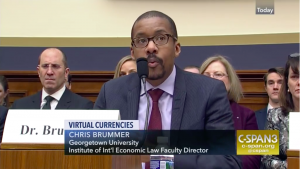
I briefed global regulators today on crypto assets at the Third Annual Consumer Payments and Finance Academy. My lesson: in the U.S., even “unregulated” (i.e. non-securities) tokens are invariably subject to some form of regulation (however unevenly enforced). This also goes, I noted for “utility” tokens.
Along those lines, I brought to their attention the fact that as a matter of current U.S. securities law, the concept of utility is rather unimportant, something I alluded to in my earlier testimony on the Hill. What is instead critical is Section 2 of the 33 Act (enumerating the financial products deemed to be securities) and the contours of the Howeytest, which provides a framework for unconventional items that can still be deemed a security. But even for products that fail to meet the definition of an investment contract, a number of other laws can still apply–from the Commodity Exchange Act (for antifraud and anti-manipulation prohibitions, and potentially even more) to the Bank Secrecy Act and more.
